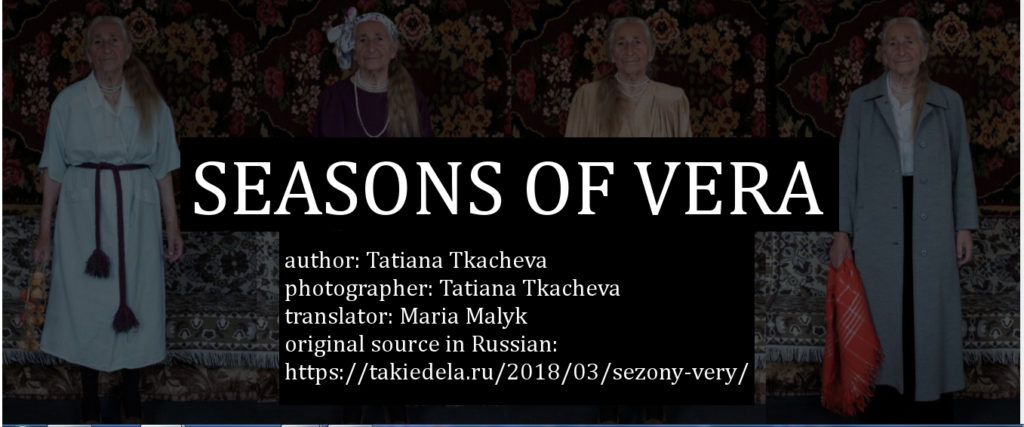Vera Zenko chased after the Nazi wagon carrying away her mother who was pregnant with her younger sister. The soldiers took pity and threw the mother off the carriage. Today, Vera is 91 years old. She calls her current life her “final seasons” and tells her biography to photographer Tatiana Tkacheva through the contents of her dress closet.
I first saw Vera in Volozhin, Belarus, when she was walking to the pharmacy. Vera was wearing enormous sunglasses, a checkered dress and raspberry-colored socks and shoes. It was love at first sight. I walked up to her to make her acquaintance and, five minutes later, we were sitting in her home and she was showing me her outfits and narrating their history. Later, I visited and stayed with Vera in Volozhin several more times.
She has lived her whole life here, during which time, the multicultural Polish city of Volozhin came under Soviet rule and later became Belorusian. Vera’s four brothers and sisters were scattered all over Ukraine and Belarus. Vasil and Olga are, by now, deceased, survived by siblings Nina and the youngest, Galina. Their parents came from a peasant background: the mother tilled the fields, while the father, who was literate, worked for the local, as they say today, “self-governing authorities”. Vera stayed in her native city. Here, she got married, taking the last name Perepecha, gave birth to three children, worked and eventually raised her grandchildren.
This past January 1st, Vera turned 91 years old. She is not afraid of old age. Once, Vera told me that she is living out her final seasons, when every spring can become the last. She loves to dress up. The closet contains her entire life: each dress comes with its own story, its own memory.
“This is the end of my life. Everything important already happened and passed. Childhood, famine, war, love, children. Papa was executed by the Germans. Mama was left alone, pregnant with Galina, with the four of us children. In memory of Papa, I keep a hand-woven belt. He never beat us but I was mischievous and, once, he threatened to punish me if I don’t stop making trouble. I got scared. Stopped acting out of spite. I keep the belt to this day.”
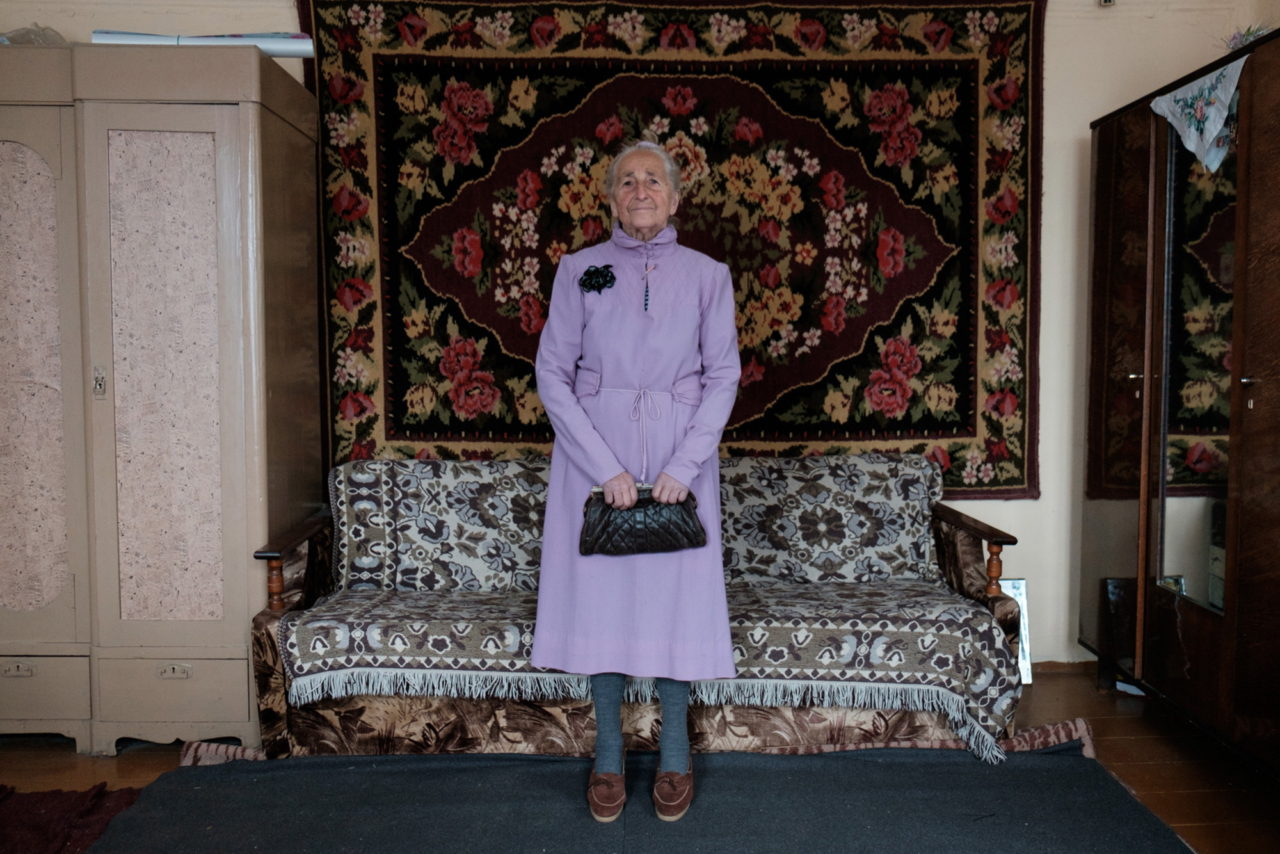 © Tatiana Tkacheva
© Tatiana Tkacheva
Vera went to buy a gold-accented fabric for her daughter’s prom dress. She was going to have the dress sewn in the House of Fashion in Minsk. But the atelier in Volozhin refused to sell the textile without a dress order. So, she had them make this lilac dress, just so that they would sell her the prom dress fabric.
“I saw myself in the mirror for the first time when I was around ten years of age. We were selling sorrel to local Jews. Their house had a mirror. I became upset when I saw my reflection — I was pale, skinny and wearing an ugly dress. I ran home and cried. Mama stood me by a pail of water and said that I am the most beautiful. For one baggie of sorrel, we were paid five kopeks. My sister and I bought necklaces. I chose the lettuce-colored one. Went to the well for water, bent down to see if it’s deep or not and — whoosh — my necklace flew down. How I cried! It is probably still down there.”
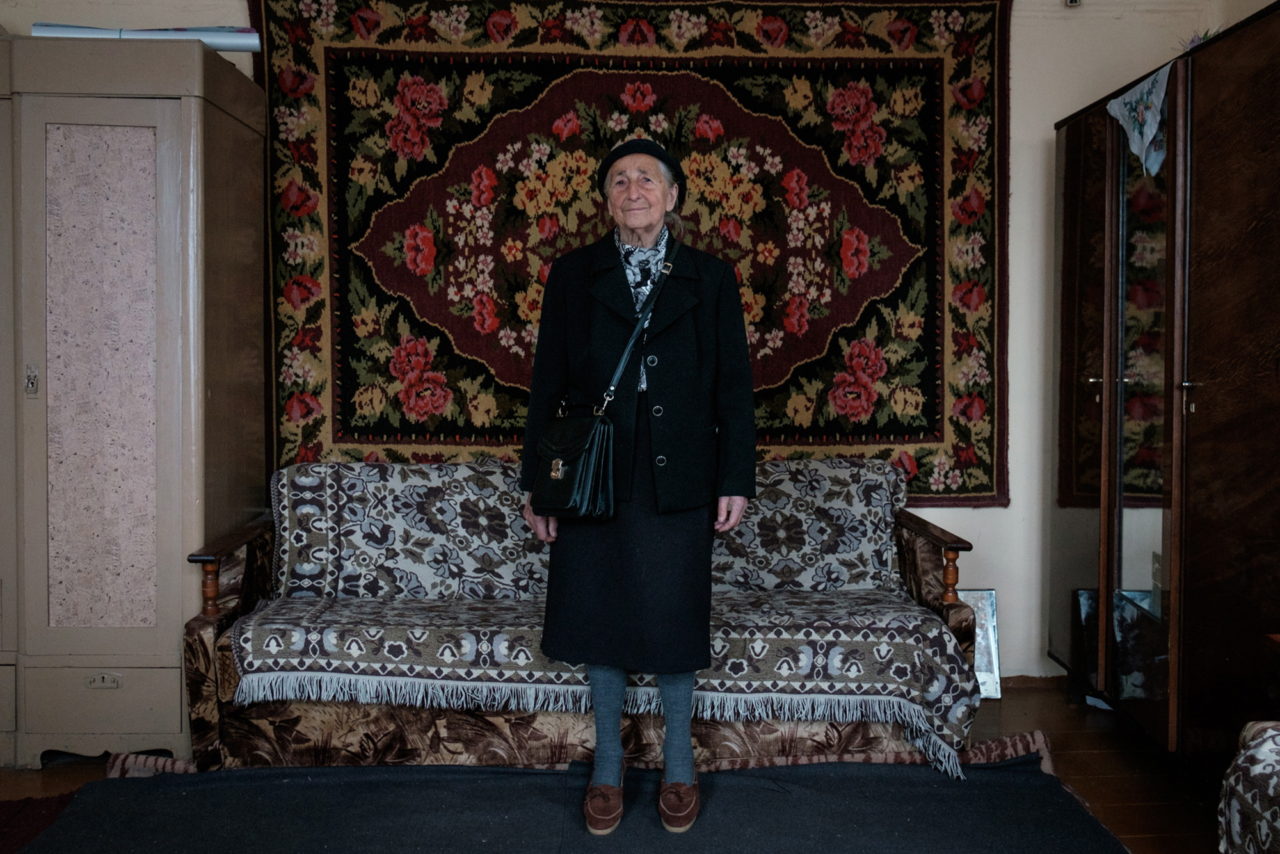 © Tatiana Tkacheva
© Tatiana Tkacheva
Vera’s outfit with a hat. She purchased the hat when she worked at the passport office in Volozhin. The hat is Vera’s favorite accessory.
 © Tatiana Tkacheva
© Tatiana Tkacheva
On the left: Vera bought this dress for her daughter, as to not let money go to waste after the collapse of the USSR. The daughter got married. The dress stayed with Vera. On the right: Vera in her daughter’s wedding dress.
“So much happened over those years. I had to obtain everything on my own: education, work. Back then, major literacy was not required. I had four years of Polish school, then we were overtaken by the Soviets and studied under them for one year, then the Germans arrived. I stayed away from their school. They were recruiting into the Yunak — that’s like the Young Pioneers for the Soviets. Me and a few other kids got scared and ran away. After the war, I completed tenth grade through night school. By then, I was already working in the passport office. I had nice handwriting and was instantly hired. I started having money. I could now sew and buy outfits. The dresses invented themselves. The styles we drew from pedestrians in the city streets. Mama made patterns. My sisters and I did the stitching. I really loved hats. When I would go to Minsk on a business trip, I would buy myself a new hat.”
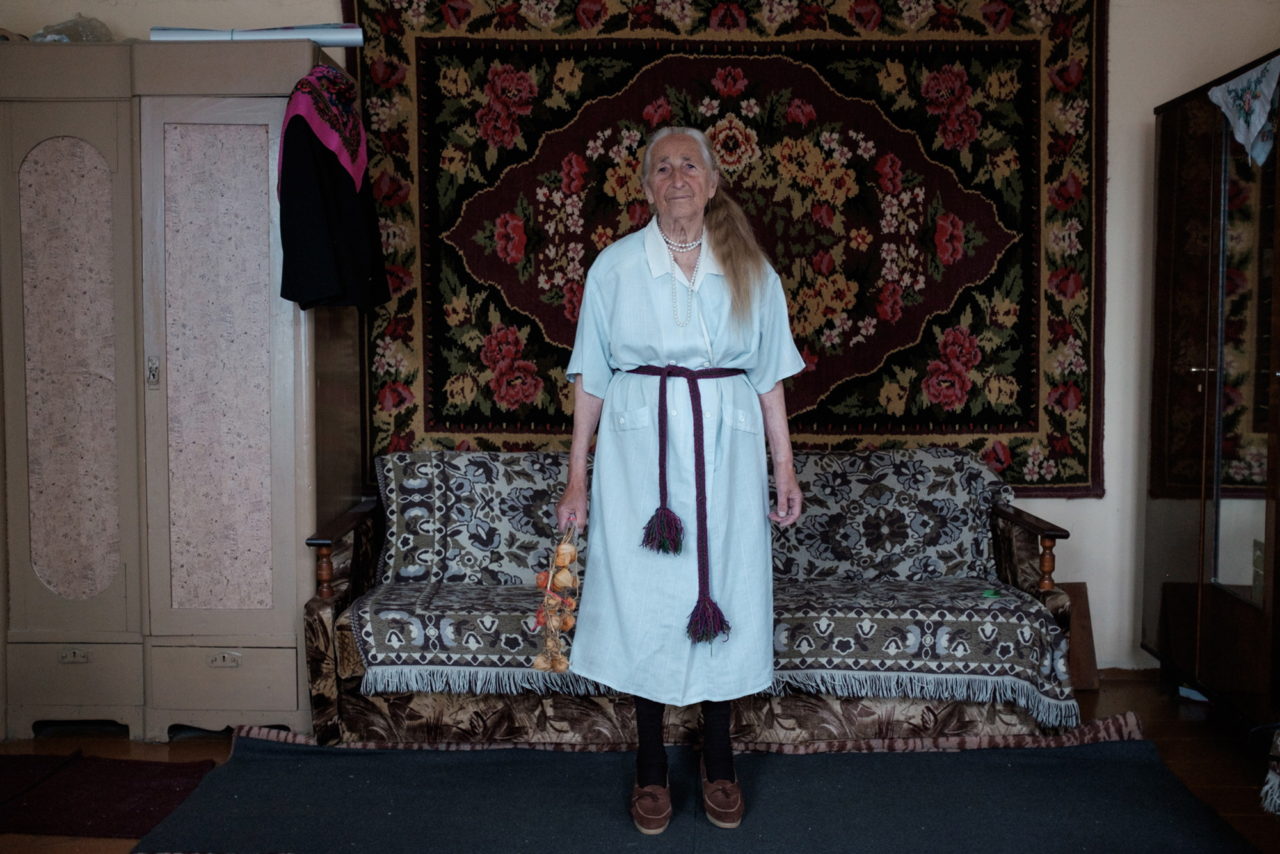 © Tatiana Tkacheva
© Tatiana Tkacheva
Vera wearing the belt she keeps in memory of her father.
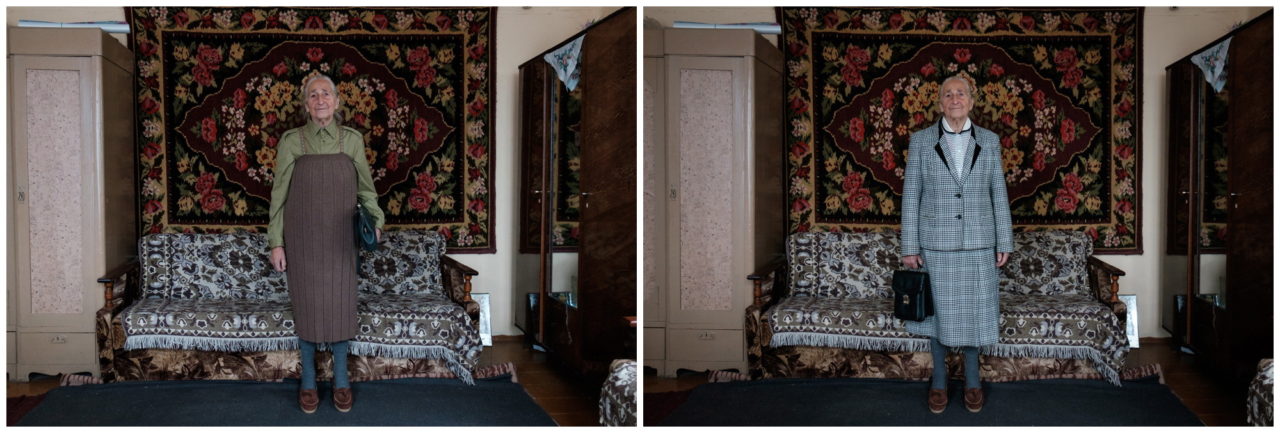
© Tatiana Tkacheva
On the left: Vera wearing a skirt she turned into a dress with straps. The shirt was sewn by her daughter to wear for school military training. On the right: A suit Vera bought in a second-hand store to wear at her granddaughter’s wedding.
“I was trendy. I liked getting dolled up. And I had plenty of suitors. But I loved Sergey, my husband. For five years we had a friendship. He spotted me for the first time when my girlfriend and I were strolling the street, in the wintertime. That was a thing to do in our town: the young would get together and promenade back and forth along the streets. The boys would check out the girls. And then walk them home.”
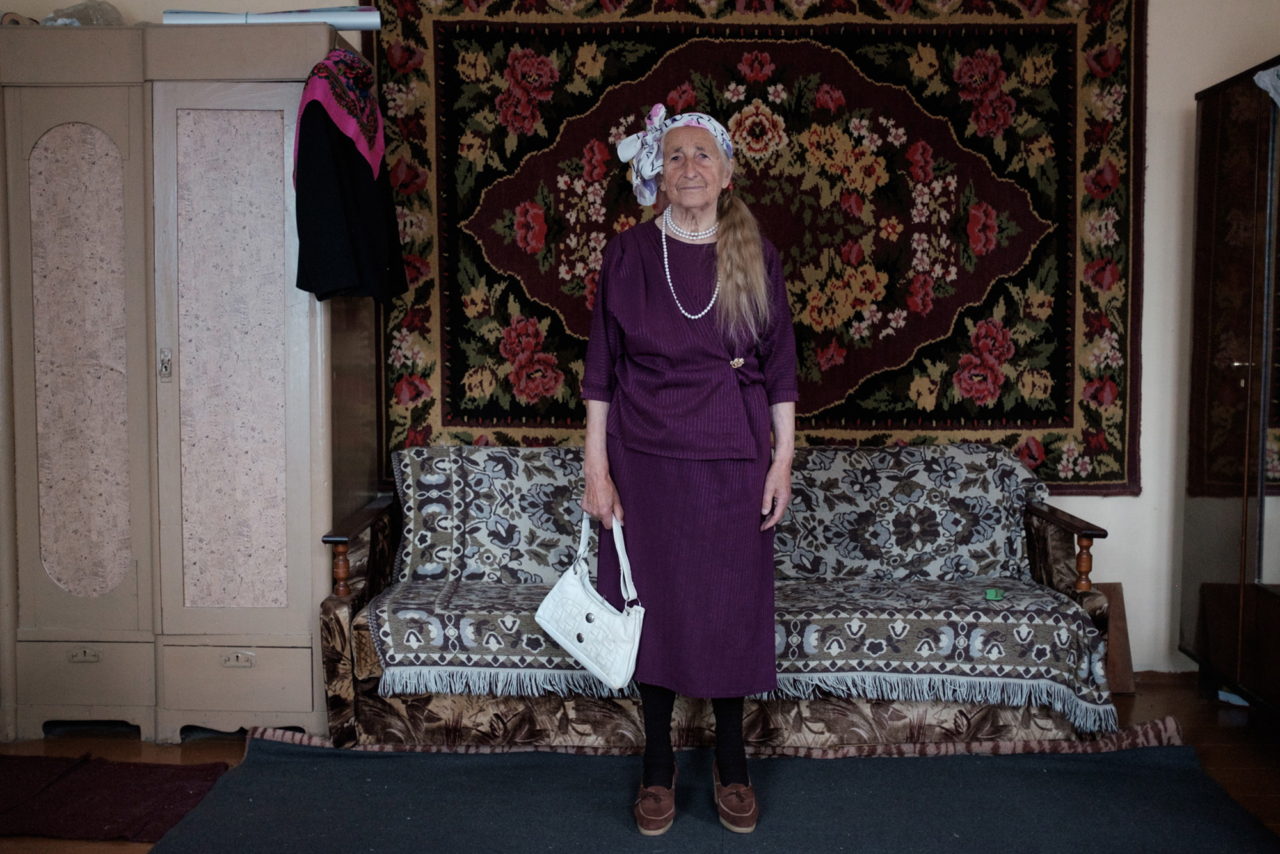
© Tatiana Tkacheva
Vera, wearing a dress handed down from a girlfriend. Purple is Vera’s favorite color.
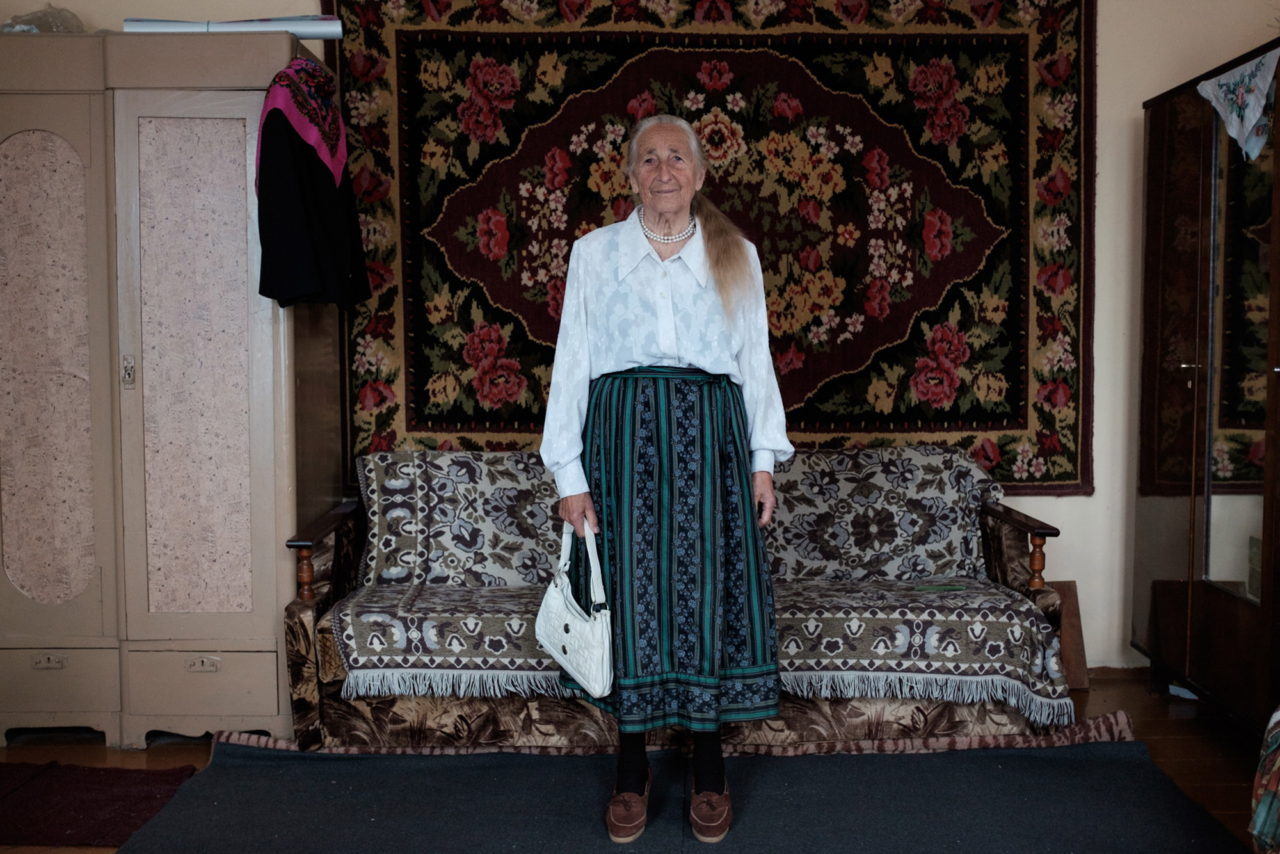
© Tatiana Tkacheva
Vera is wearing a transparent white blouse and a patterned skirt. Such white blouses were popular in Vera’s youth.

© Tatiana Tkacheva
Vera, in a dress created by her daughter for her seamstress exam. The necklace comes from France, brought by Vera’s sister.
“I procured myself a plush coat. An uncle fastened wooden heels to the rubber booties. Mama would tie a beautiful scarf on me and pin it with a brooch, so that all the flowers were visible. Sergey fell in love with that scarf. Later, he would say that he did not see me or my girlfriend, just the scarf. I was wondering why that little soldier was following us around everywhere. We lived together for thirty one years. Raised three children. Lived in peace. There was no time to quarrel.”
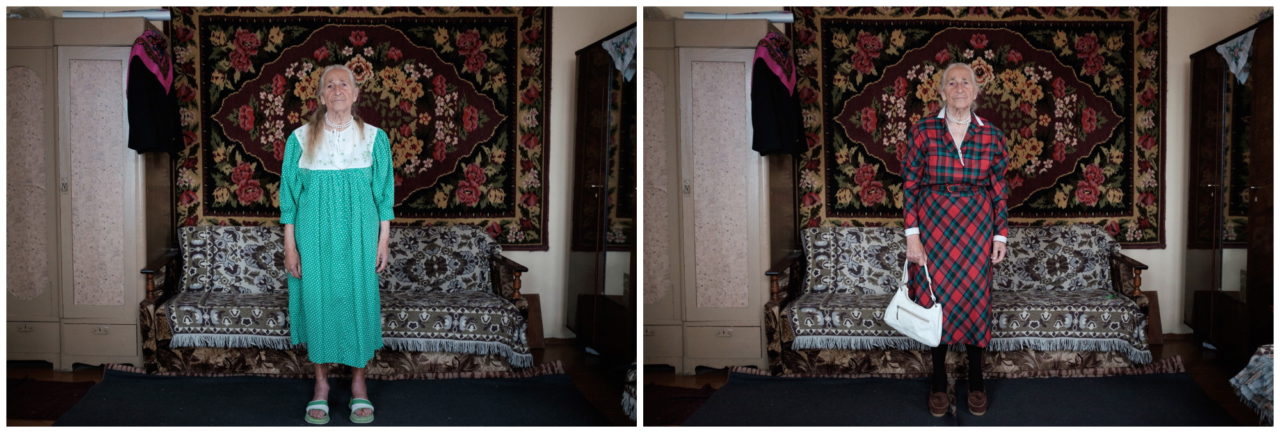
© Tatiana Tkacheva
On the left: Vera, in a dress from her daughter-in-law. Vera was already retired when her son got married. The bride’s parents were against the union. Vera let the newlywed couple live with her and helped raise their firstborn. On the right: Vera’s daughter-in-law wore this dress when she first started dating her son.
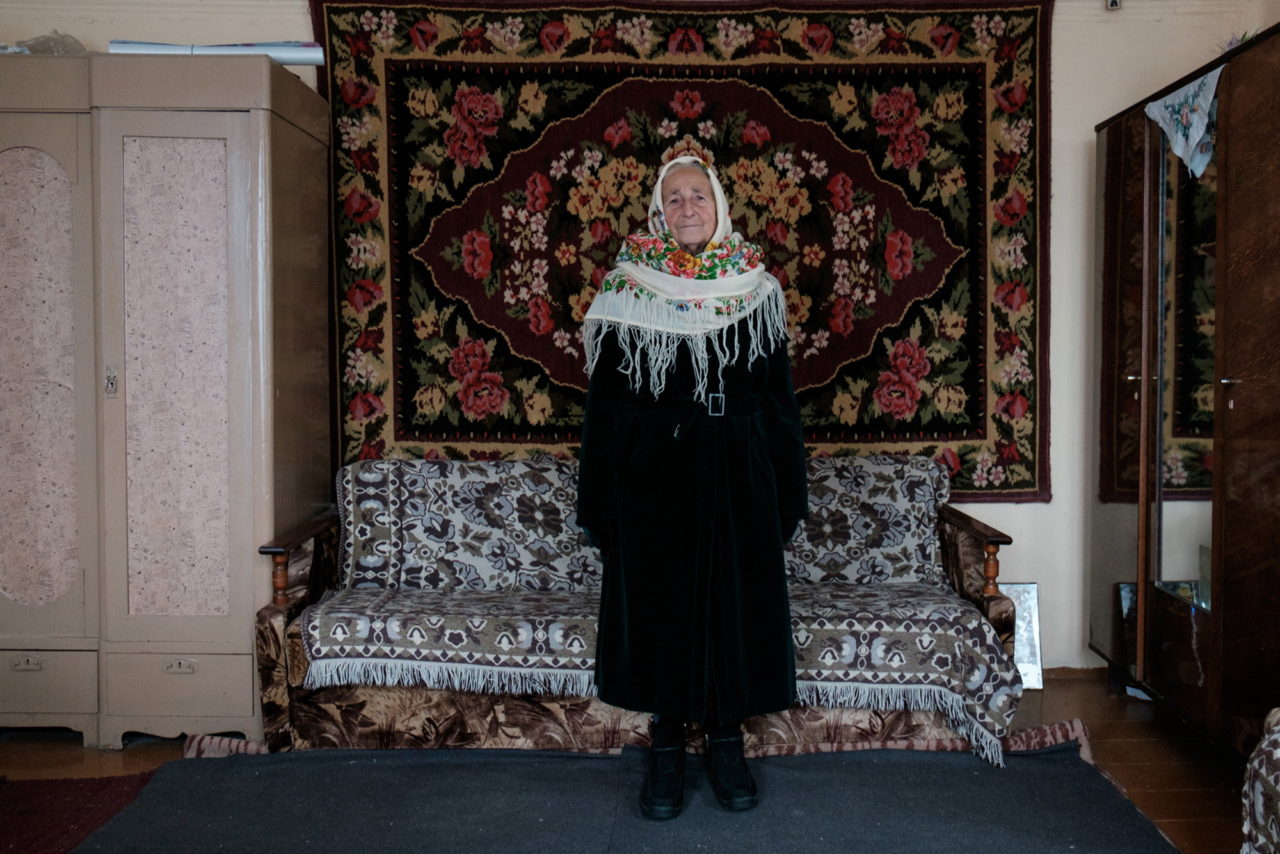
© Tatiana Tkacheva
Vera in the plush coat she got through special connections in a store in Volozhin region. She is wearing a floral pattern scarf called “shalinovka”. Vera was wearing this scarf when she first met her husband Sergey.
“Gold teeth used to be in fashion. I really wanted to put in golden crowns. Sergey tried to talk me out of it. But I did it anyway. I frequently recall how he sat me on his lap, hugged me and kept saying that he loves me. Sergey died from cancer after Chernobyl. He disintegrated in mere months. With him died all his money. I was left alone. The children were still in school and needed help. I handed all my pension over to them and tightened my belt. My mother-in-law, when she was dying, gave me her notebooks with prayers. Once I helped a woman cure her finger just by praying over her. The finger healed. Then, people started coming to me, asking for help. I did not deny them.”
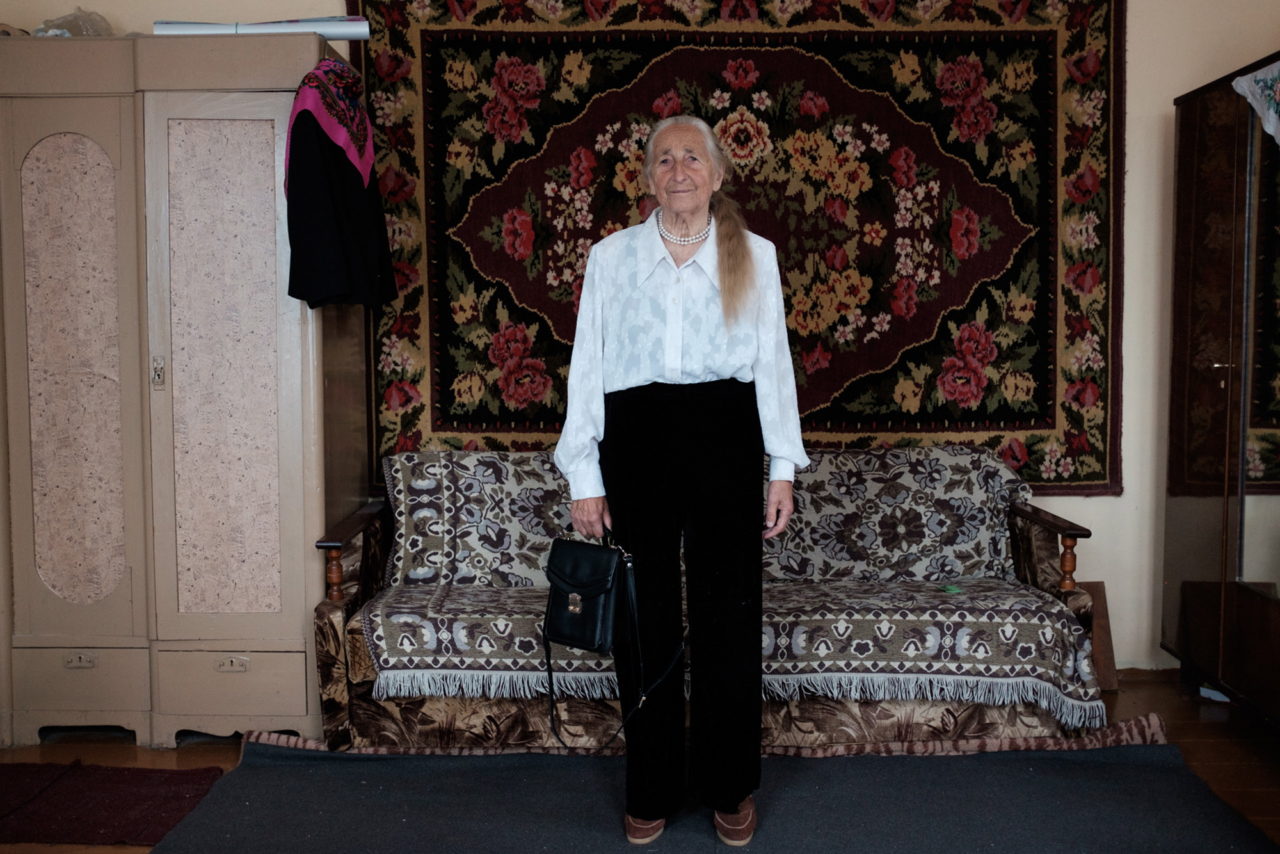
© Tatiana Tkacheva
Vera is wearing slacks she bought when she was hospitalizedl with cancer. Vera does not like slacks. In everyday life, she prefers skirts and dresses. But in the cancer ward where Vera was hospitalized, everyone wore trousers.
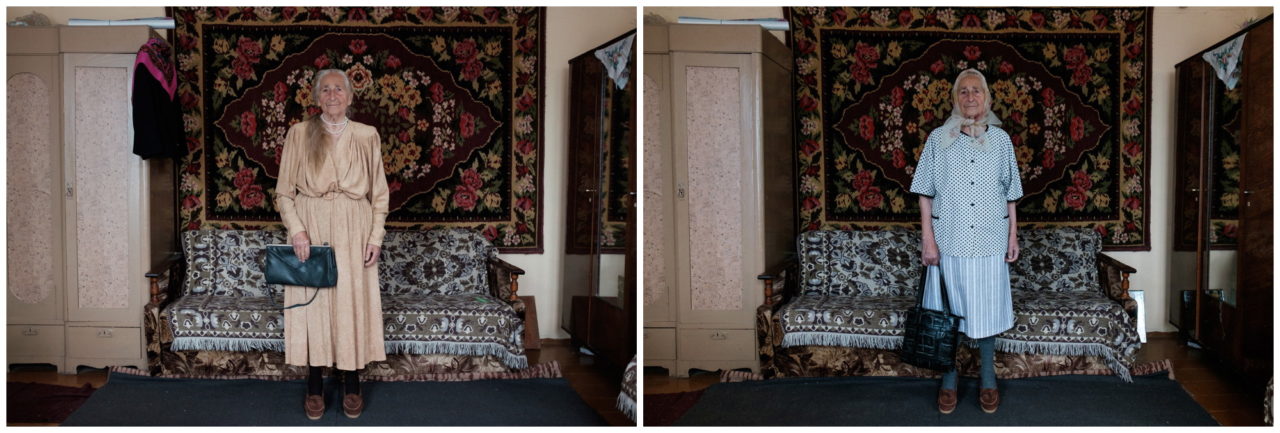
© Tatiana Tkacheva
On the left: Vera is wearing her daughter’s prom dress. To obtain this fabric so that it could be turned into a dress at the House of Fashion in Minsk, Vera had to commission another dress for herself in the Volozhin atelier (see lilac dress in first photo.) On the right: skirt and blouse, purchased by Vera at a department store 10-15 years ago.
“I did not accept money, but I did not reject food. That is how I survived. I am ugly, long-nosed. When I compliment myself, then I start to see — it’s true, I am beautiful. Each face works well with its own nose. All the young are beautiful. There is a whole album of these photographs. But life flew by as if in one day. Yours will fly by too. I’ve been thinking that it’s time to start giving away my dresses. What good are they to me? If I die, they will be thrown out. This way, I will give them away to people myself. I don’t have a favorite dress. Whichever one I am wearing is my favorite. Let me show you what treasures I have. I am so rich except I don’t have a father or a mom…”
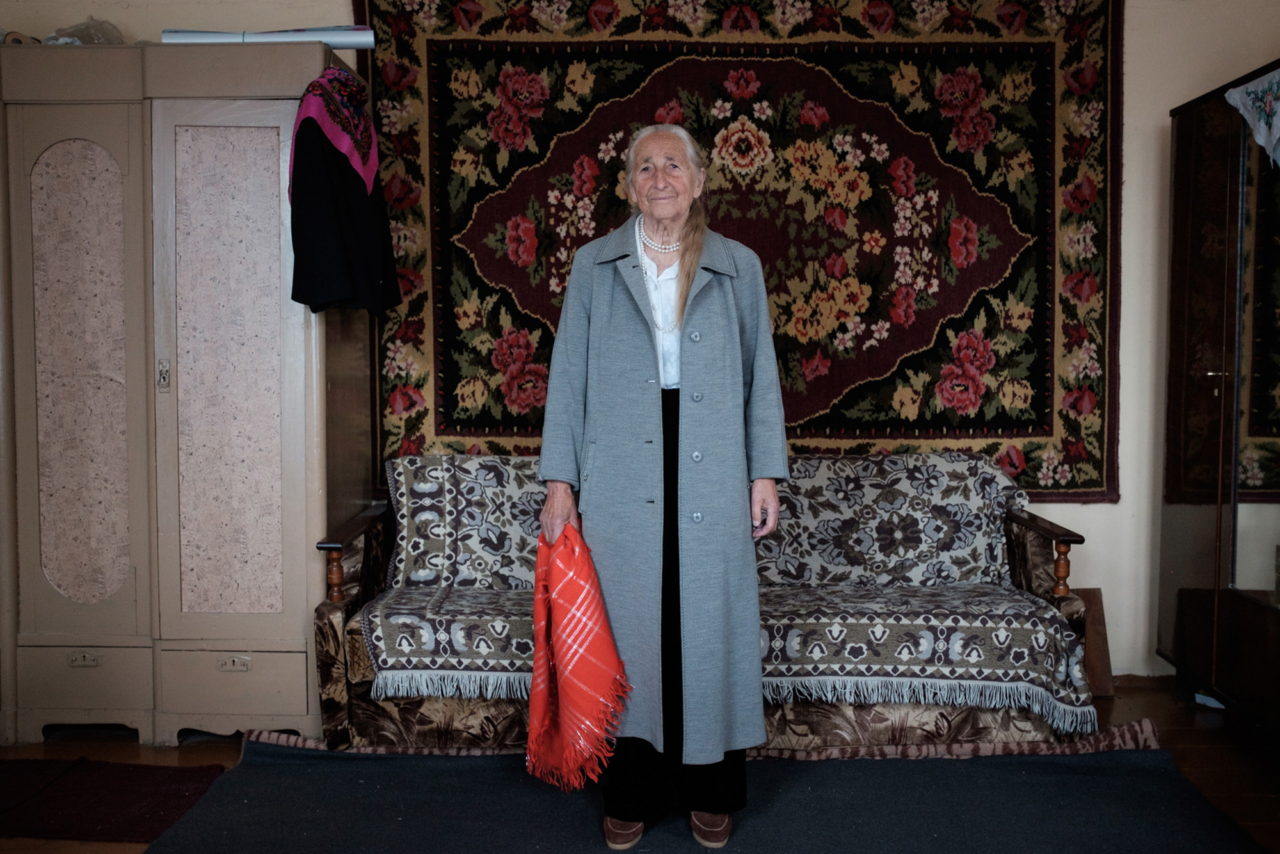
© Tatiana Tkacheva
A gray coat worn by Vera’s daughter when she was a college freshman.
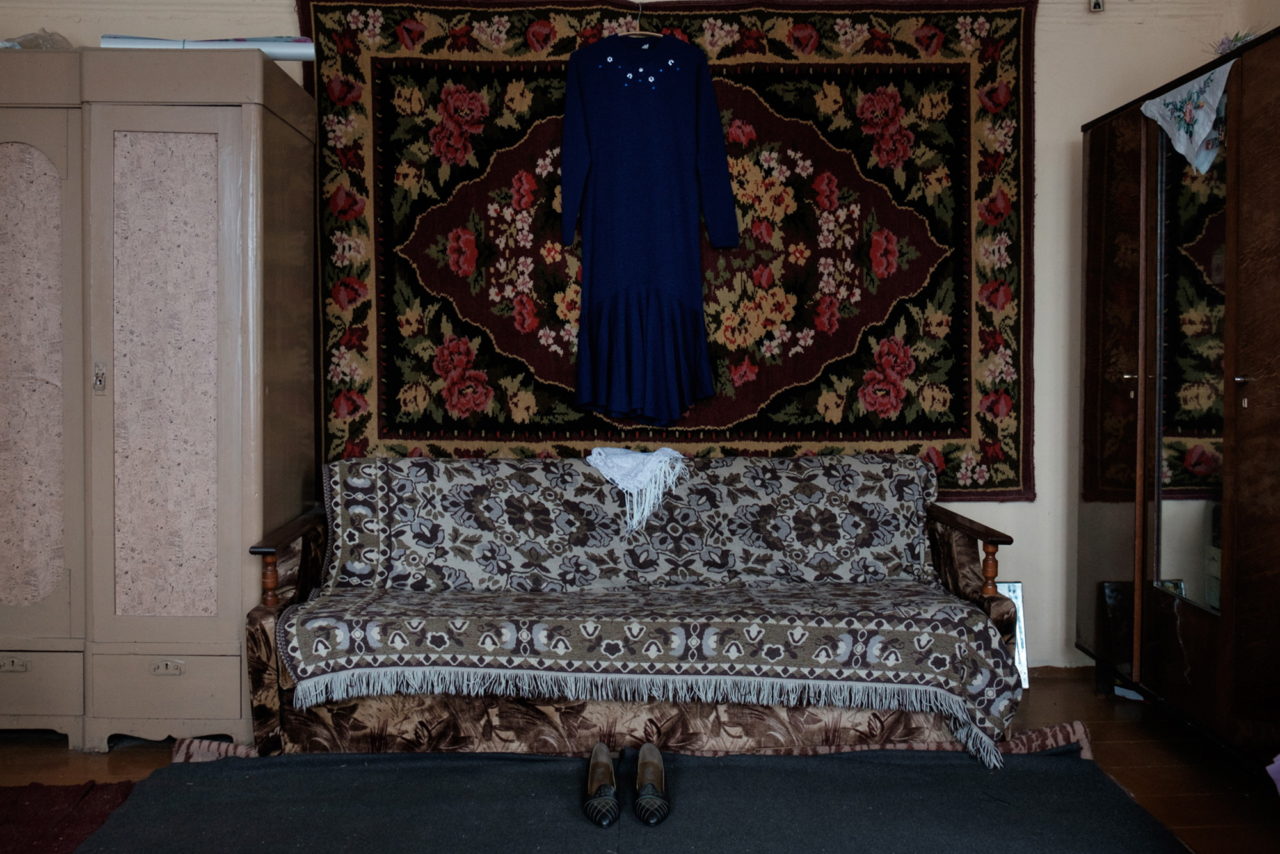
© Tatiana Tkacheva
Dress and shoes Vera set aside for her funeral.
* * * * *
*NOTE FROM THE TRANSLATOR:
I found this to be a very compelling human interest story and wanted to bring it to English-reading audiences. I had to take a few liberties and adjust the translation for easier readability / flow in English (mostly in the photo captions) — but I tried to stay true to the original voices of the author of the article and especially Vera, with her particular minimalist style of expression.
The original story in Russian was published on March 16, 2018, by Tatiana Tkacheva, on the website www.takiedela.ru that serves as the information portal for the charitable project “Nuzhna Pomosch” (“Help Needed”). I am not affiliated with them, though I do come across their posts sometimes and it appears that they do good work. They certainly deliver an admirable social service with releasing stories such as this one, from all over the vast expanse of Russia and former USSR, giving publicity to people and places overlooked or forgotten by the world at large.
